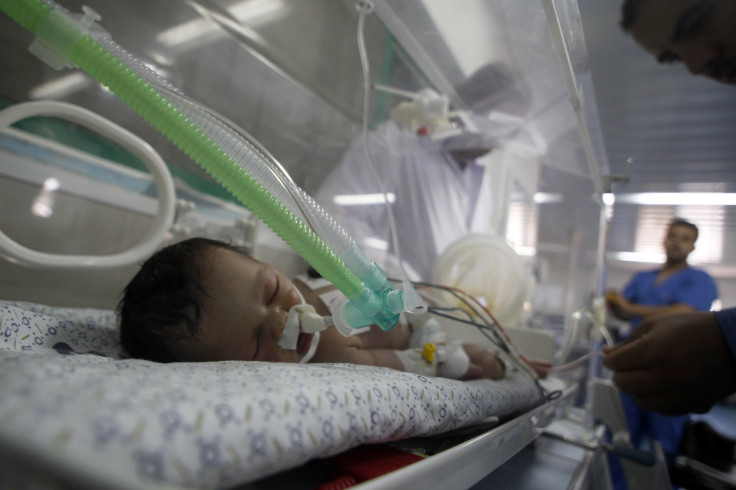Israel's Gaza Blockade: United Nations Concerned By Unprecedented Rise In Infant Mortality In Gaza Strip

The infant mortality rate among Palestinian refugees in Gaza has risen for the first time in at least 50 years, a United Nations study found. Israel's blockade of the strip, which has significantly limited imports into Gaza, was believed to be a contributing factor, a health expert for the U.N. wing operating in the Palestinian Territories said Saturday.
The United Nations Relief and Works Agency (UNRWA) conducts studies on infant mortality across the region every five years, and the recently released results initially were uncovered in 2013. The U.N. worked with independent research groups in the last two years to examine the data and ensure the results were accurate.
The study found as of 2013, neonatal mortality -- the rate of children that die before four weeks of age -- had risen to 20.3 per 1,000 live births compared to just 12 per 1,000 in 2008. U.N. experts considered the rise unprecedented and a cause for considerable concern.
“Infant mortality is one of the best indicators for the health of the community,” said Dr. Akihiro Seita, director of UNRWA’s health program, in a press release. “It reflects on the mother and child’s health and in the U.N. Millennium Development Goals it is one of the key indicators.”
Seiti said progress in combating infant mortality has rarely seen a reversal, with exceptions in some African nations struggling to combat HIV epidemic. “It is hard to know the exact causes behind the increase in both neonatal and infant mortality rates, but I fear it is part of a wider trend. We are very concerned about the impact of the long-term blockade on health facilities, supplies of medicines and bringing equipment into Gaza,” Seita said.
For 1st time in 5 decades, mortality rate increased among Palestine refugee newborns in #Gaza according 2 latest but 2 year old @UNRWA data
— Chris Gunness (@ChrisGunness) August 3, 2015Israel imposed a blockade on the Gaza strip in 2006 after Hamas, which Israel considers a terrorist organization, won a popular election in Gaza. Israeli leaders have said the blockade is necessary to prevent militants in Gaza from using supplies to build weapons to attack Israel. But human rights groups have said the blockade has strangled the Palestinian economy and has prevented residents from obtaining much needed aid and materials.
The U.N. agency noted the results of infant mortality were recorded before last summer's 50-day war, which saw more than 2,000 Palestinians killed. Among those who died during the conflict, more than 500 were believed to be children. The blockade of Gaza, which has severely restricted access to goods like concrete and fuel, has hindered reconstruction efforts in the region, as thousands of homes remain severely damaged. Previous shipments of concrete were used to construct tunnels used for smuggling both goods and would-be terrorists.
© Copyright IBTimes 2024. All rights reserved.






















